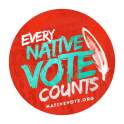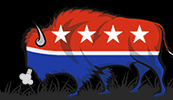 Vote! There are 2 articles below.
Vote! There are 2 articles below.
Indians won right to vote
Published: 07.25.2008 ANNE T. DENOGEAN Tucson Citizen
When Ira Hayes, a Pima Indian famous for helping raise the flag at Iwo Jima, returned to Arizona after World War II, he couldn’t vote.
Neither could the Navajo and Hopi men who served as code talkers. And more important for history’s sake, neither could veteran Frank Harrison, a Fort McDowell Yavapai who did something about it.
Harrison, along with his friend Harry Austin, a tribal chairman, filed a suit that ended 60 years ago this month with a state Supreme Court ruling that confirmed the right of American Indians to vote in Arizona.
In the July 15, 1948, decision, Judge Levi S. Udall wrote, “To deny the right to vote where one is legally entitled to do so, is to do violence to the principles of freedom and equality.”
Patricia Mariella and Violet Mitchell-Enos researched the story of Harrison and Austin for an Inter Tribal Council of Arizona project nearly 30 years ago.
They interviewed Frank Harrison, now deceased. He told of how he and Austin walked into the Maricopa County Recorder’s office to register on Nov. 8, 1947, and were turned away.
“A young man – he refused to register us: ‘You’re under the ward of (the) government,’ ” Harrison said.
By Arizona law, American Indians were considered to be under federal guardianship and, along with “mental incompetents,” were ineligible to vote.
This unfair treatment was troubling to American Indians of Harrison’s generation, but what drove him on the issue was a desire to make things better, rather than dwell on the negative, said Mitchell-Enos, a Prescott Yavapai.
“He was not just thinking about the limitations that were placed on him at the time but what could be in the future for the children,” she said.
Indians who lived on reservations were not American citizens prior to World War I and were exempt from the draft, according to the ITCA report. In spite of that, more than 8,000 American Indians signed up to protect the United States.
Dr. Carlos Montezuma, a Yavapai who was one of the first American Indian physicians, wrote editorials about the irony of American Indians fighting for freedoms abroad that they didn’t share at home and pushed for citizenship. His efforts and those of other Indian rights leaders helped persuade Congress to pass the Indian Citizenship Act in 1924.
In 1940, a Congress that needed all able bodies for the impending war reaffirmed the citizenship of American Indians both on and off reservations, in the Nationality Act, ITCA said.
But citizenship didn’t mean American Indians could vote. States set voting procedures and some states, including Arizona, used every possible justification to deny American Indian voting rights. Indians were federal wards, didn’t pay state taxes, were residents of the reservation not the state or, as participants in tribal communities, they weren’t “civilized.”
Utah kept Indians from voting until 1957. Maine denied American Indians the right to vote in national elections until 1954 and in state elections until 1967. New Mexico overtly prohibited American Indians from voting in state elections until 1962.
When Harrison returned from the war, he saw that the elderly in his community were being denied old age assistance and other federal benefits based on the same rationale by which the native people were denied voting rights, the ITCA report said.
Harrison and Austin filed a lawsuit that would dually challenge the denial of voting rights and federal benefits. The American Civil Liberties Union, the National Congress of American Indians and the U.S. Attorney’s Office later filed briefs in support. The men lost in Superior Court but won on appeal to the Arizona Supreme Court, ITCA said.
The ruling, while it gave American Indians the right to vote, didn’t break down all barriers to Indian voting.
Arizona still had a literacy requirement to vote. Literacy laws were a device used mostly by Southern states and Western states with significant native populations to disenfranchise minority voters.
To be able to register to vote in Arizona after 1948, Indians still had to be able to write and to read the U.S. Constitution without prompting, a requirement that disqualified 80 percent or more of American Indian voters, ITCA said. Arizona repealed the requirement only after the federal Voting Rights Act of 1965 prohibited the use of literacy tests to deny people the right to vote.
That won the state some special attention from the feds that continues today. Arizona, along with Alabama, Alaska, Georgia, Louisiana, Mississippi, South Carolina, Texas and Virginia were singled out as discriminatory jurisdictions. Under the 1965 act, Arizona, cannot enact voting procedural changes through 2031 without the approval of the U.S. attorney general.
John Lewis, ITCA’s longtime executive director, said ITCA honored Harrison in 1980 and found that many in his own community on the Fort McDowell Yavapai Nation didn’t know of his role in American Indian voting rights. Harrison didn’t talk much about the historic case.
“He felt had done what needed to be done,” Lewis said.
Sixty years after that court decision, the American Indian voting bloc is widely recognized and wooed by politicians. “They are out there meeting and greeting and going to events on all the reservations,” Lewis said. “Politicians can count and they can count the Indian vote.”
American Indian clout in Arizona sometimes manifests as the swing vote. An exceptional Indian turnout in 2002 helped put Janet Napolitano into office as governor in a race decided by 11,819 votes.
Anne T. Denogean can be reached at adenogean@tucsoncitizen.com and 573-4582. Address letters to P.O. Box 26767, Tucson, AZ 85726-6767. Her columns run Tuesdays and Fridays.
“Just why the Indians shouldn’t vote is something I can’t understand.”
“The Life of Henry Mitchell, “Old Town, Maine, Robert Grady, interviewer, circa 1938 1939 American Life Histories, 1936-1940
On June 2, 1924, Congress granted citizenship to all Native Americans born in the U.S. Because the right to vote was governed by state law, until 1948 some states barred Native Americans from voting. In a WPA interview from the 1930s, Henry Mitchell describes the attitude toward Native Americans in Maine, one of the last states to comply with the Indian Citizenship Act:
One of the Indians went over to Old Town once to see some official in the city hall about voting. I don’t know just what position that official had over there, but he said to the Indian, ‘We don’t want you people over here. You have your own elections over on the island, and if you want to vote, go over there.’
At the time of the Indian Citizenship Act, the Dawes Severalty Act shaped U.S. Indian policy. Since 1887, the government had encouraged Native Americans to assimilate. Hoping to turn Indians into farmers, the federal government redistributed tribal lands to individuals in 160-acre allotments. Unclaimed or “surplus” land was sold, and the proceeds used to establish Indian schools where Native-American children learned reading, writing, and the domestic and social systems of white America. By 1932, the sale of both unclaimed land and allotted acreage had resulted in the loss of two-thirds of the 138 million acres Native Americans held prior to the Dawes Act.
In addition to extending voting rights to Native Americans, Congress created the Meriam Commission to asses the impact of the Dawes Act. Completed in 1928, the Meriam Report described how government policy oppressed Native Americans and destroyed their culture and society.
The poverty and exploitation resulting from the paternalistic Dawes Act spurred passage of the 1934 Indian Reorganization Act. This legislation promoted Native American autonomy by prohibiting allotment of tribal lands, returning some surplus land, and urging tribes to engage in active self-government. Rather than imposing the legislation on Native Americans, individual tribes were allowed to accept or reject the Reorganization Act. From 1934 to 1953, the U.S. government invested in the development of infrastructure, health care, and education, and the quality of life on Indian lands improved. With the aid of federal courts and the government, over two million acres of land were returned to various tribes during this period. http://memory.loc.gov/ammem/today/jun02.html
**1924: The Indian Citizenship Act grants citizenship to American Indians, but many western states prohibit their voting. http://www.autry-museum.org/explore/exhibits/suffrage/suff_time.html
